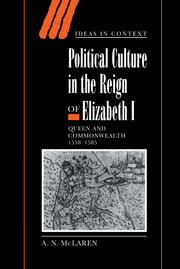Book contents
- Frontmatter
- Contents
- Acknowledgements
- Introduction
- 1 ‘To be Deborah’: the political implications of providentialism under a female ruler
- 2 Announcing the godly common weal: Knox, Aylmer and the parameters of counsel
- 3 Feats of incorporation: the ideological bases of the mixed monarchy
- 4 Contesting the social order: ‘resistance theory’ and the mixed monarchy
- 5 Godly men and nobles: the bicephalic body politic
- 6 Godly men and parliamentarians: the politics of counsel in the 1570s
- 7 Rewriting the common weal: Sir Thomas Smith and the De Republica Anglorum
- Afterword
- Bibliography
- Index
- IDEAS IN CONTEXT
6 - Godly men and parliamentarians: the politics of counsel in the 1570s
Published online by Cambridge University Press: 06 August 2009
- Frontmatter
- Contents
- Acknowledgements
- Introduction
- 1 ‘To be Deborah’: the political implications of providentialism under a female ruler
- 2 Announcing the godly common weal: Knox, Aylmer and the parameters of counsel
- 3 Feats of incorporation: the ideological bases of the mixed monarchy
- 4 Contesting the social order: ‘resistance theory’ and the mixed monarchy
- 5 Godly men and nobles: the bicephalic body politic
- 6 Godly men and parliamentarians: the politics of counsel in the 1570s
- 7 Rewriting the common weal: Sir Thomas Smith and the De Republica Anglorum
- Afterword
- Bibliography
- Index
- IDEAS IN CONTEXT
Summary
But if he [Member of the House of Commons] range in evil words, then [it is necessary] to interrupt him, saying, ‘I pray you to spare these words. They become not this place that is a place of state and counsel.’
William Lambarde, Notes on the Procedures and Privileges of the House of Commons (1584)In the ninth parliament of Elizabeth's reign (1597–8), in the course of a heated debate on monopolies, MP Sir Edward Hoby was shocked by the appearance outside parliament of ‘a multitude of people who said they were commonwealth men and desired [the House] to take compassion of their griefs’. In the parliament of 1601 Robert Cecil similarly complained that ‘Parliament matters are ordinarily talked of in the street. I have heard myself, being in my coach, these words spoken aloud: “God prosper those that further the overthrow of these monopolies. God send the prerogative touch not our liberty.”’ He reminded his auditors ‘that whatsoever is subject to a public exposition cannot be good’, and implicitly blamed those in the House of Commons who, he suggested, shared the secrets of the House with men out of doors. They ‘would be glad that all sovereignty were converted into popularity’.
- Type
- Chapter
- Information
- Political Culture in the Reign of Elizabeth IQueen and Commonwealth 1558–1585, pp. 161 - 197Publisher: Cambridge University PressPrint publication year: 1999



